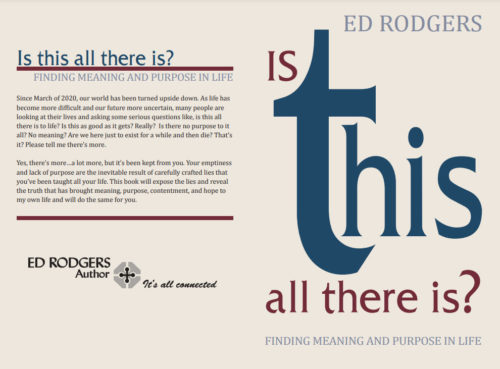Description
Book Preview
Separating the Earthly from the Heavenly
Our nation’s connection to national Israel is quite different from the Church’s connection. Our nation’s relationship stems primarily from the three verses presented on page 8. It’s all about loving what God loves and protecting what is precious to Him. It’s about being a trustworthy friend to the people and nation God has chosen, not because they deserved anything, but because they were insignificant (Deut. 7:6-8). He chose them simply because He loved them. They were to be an example of what a mighty God could do to and through a small and powerless people. They were to be His ambassadors to the world.
For the Church’s connection, we must separate the earthly (physical) from the heavenly (spiritual). In the physical realm, the Church’s “Israeli heritage” is unmistakable. God’s salvation message was spread from Israel, through Israel’s prophets, and Israel’s Messiah. God’s chosen vehicle for introducing Himself to the world was the nation of Israel. Our Bible and most of its human authors were Jews from Israel. The physical (earthly) connections between the Church and national Israel are many. There is no doubt that in the physical, earthly realm the Church’s roots go deep into its Jewish heritage.
The video now takes a new direction, showing that in the spiritual realm, it’s a different story, and it’s all about the heavenly message God entrusted to the apostle Paul. His teachings were unique in that they stressed the heavenly (vertical) nature of the Christian and the Church as opposed to the earthly (horizontal) nature of national Israel and every “kingdom” in which Israel participates (Jn. 3:31). In His letters, he stresses that everything pertaining to the Christian and the Church comes directly from heaven. Your thoughts take you to Galatians 1:12 where Paul states that the gospel he preached came not from men, but from a direct revelation of Jesus Christ (in heaven).
As you briefly consider Paul’s writings as a whole, you see that he reveals a direct vertical connection to the heavenly God, who is the source of everything the Christian and the Church receive. Thus, the relationship is one of grace—God giving His children that which they don’t deserve and could never earn. Although the Church was born on earth during the Feast of Pentecost, she will return to her heavenly source on the Day of the Rapture.
The video pauses as you stop to consider the significance of this heavenly relationship. You realize that you had been guilty of glossing over words like “heavenly” and “grace” and had failed to notice that they are exclusive to Paul’s messages to the Church. While he never used the terms, “earthly,” “horizontal,” or “vertical,” his use of “heavenly’ implied a contrast to everything not heavenly. Suddenly, this difference becomes clearer. Everything pertaining to national Israel is earthly (horizontal) (Jn. 3:31). In fact, until Paul came on the scene, everything was on this earthly horizontal plane, including the teachings of Jesus. Since the indwelling Holy Spirit didn’t come until after His death and resurrection, everyone Jesus taught had to respond in the flesh (as earthly as you can get). There was no other option. Everything was on an earthly horizontal level. The heavenly relationship was not even introduced until Paul came on the scene after Jesus had been taken up to heaven.
As you consider Paul’s writings from this heavenly perspective, you see that that Paul was distinguishing the Church from everything that came before her, which was earthly and horizontal, including Israel’s New Covenant, the Synoptic Gospels, and the Sermon on the Mount. Over and over, Paul was pleading with his readers not to forsake their heavenly calling by regressing into one of the greatest manifestations of an earthly/horizontal relationship—legalism.
The video resumes, focusing on the Church, Jesus’s joy—His crowning glory. You soon see that it far surpassed anything that had come before. It brought things never anticipated or imagined by man. It had been a mystery until Paul, God’s chosen vessel, revealed to us what Jesus had revealed to him in his heavenly vision (Gal. 1:12). His love for His Church motivated Him to give Himself for it on the cross, so that He could cleanse and sanctify her with the washing of water by the (rightly divided) Word of truth. He would present her to Himself, a glorious Church, having neither spot nor wrinkle, nor any such thing, but that she should be holy and without earthly blemish (Eph.5:25-27). Jesus never said anything like this to Israel. Even though Paul was an Israelite, his direct (vertical) revelation from the resurrected Christ showed him that the Church was to be kept separate from all else, including Israel and her Law.
This comes as a shock. Separate from Israel? How can this be? This doesn’t seem right…unless your understanding of the Church had missed something, something really big. Suddenly, your mind recalls Paul’s explanation to the churches in Galatia—There is neither Jew nor Greek, there is neither slave nor free man, there is neither male nor female; for you are all one in Christ Jesus. Paul seems to be saying that those in Christ—born again believers, members of the Church, have become something new, separated from our former identity. Could this be the new creation of 2 Corinthians 5:17 which left the old behind? Could this be the oneness Jesus prayed for in John 17? Could this be the “one new man” Paul alluded to in his letter to the church at Ephesus?
If what seems to be true is in fact true, then the distinction between the Church and national Israel makes sense. If a Jew accepts Jesus as the Messiah and his personal Savior, he becomes a new creation just as the believing Gentile. As members of the Church, both have a new identity. There is no longer Jew or Greek. All in the Church are now new creations. The light of revelation suddenly brightens. The book of Hebrews makes a little more sense now, especially the pleas to grasp the superiority of Jesus, God’s anointed, over all those things in the Jewish readers’ past.
What is the Church’s Connection?
If the Church is spiritually distinct from Israel and her law, what is the nature of the “Israeli connection”? What is the Church’s obligation to Israel? As you ponder the question, your mind falls on the beginning of Romans 11: But by their transgression, salvation has come to the Gentiles to make them (the Jews) jealous. You’ve read and considered this statement before, but you saw no












Reviews
There are no reviews yet.